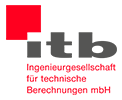
Does it light up? For sure!
ITB GmbH receives BMWK innovation funding for light simulation
Today, the simulation of light is essential in the product development of industrial and consumer goods, for example, when it comes to optimal lighting solutions for aircraft and vehicles, interiors and buildings, or safety-relevant lighting. Large companies use complex simulation software for this purpose, which reduces time and costs in product development and at the same time achieves better results. For financially strong companies, the acquisition of such cost-intensive software is worthwhile. But can smaller companies also benefit from the technology?
“There is currently no commercial software for light simulation that would be profitable for the majority of SMEs. The high costs of acquisition and programming deter many companies. This slows down the innovative power of SMEs. The goal is to develop a cost-efficient solution that also enables smaller companies to use light simulation,” explains Dr. Frank Brehmer, managing partner of ITB Ingenieurgesellschaft für technische Berechnungen mbH. In a study, ITB GmbH is investigating the feasibility of an easily scalable, automated solution for light simulations that can be quickly and cost-effectively transferred to different fields of application.
For this project, the engineers from Dortmund have now received funding approval from the German Federal Ministry of Economics and Climate Protection (BMWK), which uses the Central Innovation Program for SMEs (ZIM) to support ambitious research and development projects by medium-sized companies with a high level of innovation.
Dr. Frank Brehmer and his team are specialists in component analysis and component verification using FEM calculations. Since its foundation in 2004, ITB has implemented more than 2,700 international projects in various industries. The experienced engineers support their customers in the concept phase and throughout the product development process. In 2019, they successfully implemented the innovation project “Digital Twin”, funded by the German Federal Ministry of Education and Research (BMBF).

